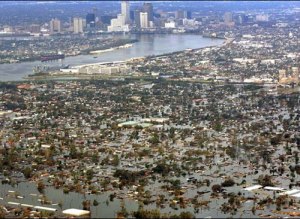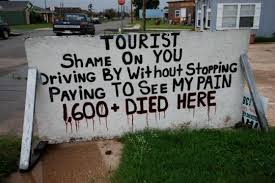 “We finally cleaned up public housing in New Orleans. We couldn’t do it, but God did.” Those were the damning words of Richard Baker, Republican US representative of Louisiana from 1987 to 2008, in response to the disastrous consequences of Hurricane Katrina. With representatives like that, you don’t need enemies.
“We finally cleaned up public housing in New Orleans. We couldn’t do it, but God did.” Those were the damning words of Richard Baker, Republican US representative of Louisiana from 1987 to 2008, in response to the disastrous consequences of Hurricane Katrina. With representatives like that, you don’t need enemies.
As the son of a Methodist minister, Baker probably knew the famous words of that Christian hymn written in 1773 by the English poet, William Cowper:
“God moves in a mysterious way
His wonders to perform;
He plants His footsteps in the sea
And rides upon the storm.”
Even for a politician, it was a callous proposition: to see Hurricane Katrina as God’s mysterious way of riding upon the storm, efficiently cleaning up public housing in New Orleans! No questions asked about those swept away as God performed his wondrous work. It was all divinely ordained.
In 1748, the English clergyman and poet John Newton wrote another very popular hymn, “Amazing Grace.” Newton later collaborated with Cowper in composing Christian hymns. But, first, he traded in enslaved Africans. Wikipedia tells the story of “Amazing Grace”: “In 1748, a violent storm battered his vessel off the coast of County Donegal, Ireland, so severely that he called out to God for mercy, a moment that marked his spiritual conversion. Whilst his boat was being repaired in Lough Swilly, he wrote the first verse of his world famous song.”
Newton’s “spiritual conversion” did not make him immediately abandon his career in human trafficking. He carried on for another five years or so. I suppose God, in his mysterious mercy, had not yet performed the wonderful work of converting Newton from his profitable career. Sometimes, like God, his servants need to plant their footsteps in the sea and ride upon the storm until the right season. Newton eventually turned to the study of theology and was ordained in the Church of England in 1774.
MICHELLE OBAMA’S QUESTION
Ironically, “Amazing Grace” has been completely taken to heart by African-Americans, with no misgivings about its origin. The song is now a dubious ‘traditional’ spiritual. In a defining moment of his political career, when Barack Obama came out unquestionably as African-American, he performed this song in his eulogy at the funeral of the Rev Clementa Pinckey.
In a July 7, 2015 ABC news report on ‘The Story Behind President Obama Singing ‘Amazing Grace’ at Charleston Funeral’, his wife, Michelle, is quoted, asking a sceptical question: “Why on earth would that fit it in?” Obama responded in this way: “I think if I sing, the church will sing with me.” He was right. But Michelle was also right to wonder how “Amazing Grace” could possibly console a congregation battered by racial violence.
The idea of ‘God’ and the promise of ‘grace’ are often used in mysterious ways to justify acceptance of injustice on Earth, with the expectation of reparations in the hereafter:
“Through many dangers, toils and snares
I have already come;
‘Tis Grace that brought me safe thus far
and Grace will lead me home.”
Grace was not able to save the nine church members who were gunned down in the Emanuel African Methodist Episcopal Church; nor the hundreds of African-Americans who lost their lives in Hurricane Katrina. Grace has not led back home to New Orleans almost 100,000 exiled African-Americans. Parts of the city, especially the 9th Ward, still look like a ghost town. It’s as if the hurricane hit this season, not a decade ago.
TEK BAD TINGS MEK JOKE
Last month, I went to New Orleans to speak at a conference, “Community Uprising: Katrina, Resilience, Resistance & Culture After 10 Years”, hosted by the Institute of Women and Ethnic Studies. President and CEO, Dr Denese Shervington, a psychiatrist from Jamaica, asked me to address the role of culture as a source of resistance to oppression, with reference to reggae and dancehall.
I talked about Bob Marley’s vision of reggae as a drumbeat, “playing a rhythm resisting against the system.” I looked at the origins of the limbo dance in the horrific conditions of the Middle Passage. I cited the proverb, “tek bad tings mek joke”, which highlights one of our survival strategies for coping with disaster. And I used Lovindeer’s “Wild Gilbert” to illustrate the point.
But I concluded with the warning that laughter cannot be the only response to oppression. We can take a joke only so far. And too far! We must also take political action to transform dehumanising institutions. And that is what is still needed in New Orleans for full recovery from Hurricane Katrina.
 The African-American community has been gutted by the disaster. Many homeowners have had to sell out. Annual property taxes have moved from $800/$900 to $4,000/$5,000. New Orleans is rapidly being ‘gentrified’, thanks to Hurricane Katrina. God cleaned up public housing, historically occupied by African-Americans. The divinely favoured are reaping the spoils. The way is clear for them to move in.
The African-American community has been gutted by the disaster. Many homeowners have had to sell out. Annual property taxes have moved from $800/$900 to $4,000/$5,000. New Orleans is rapidly being ‘gentrified’, thanks to Hurricane Katrina. God cleaned up public housing, historically occupied by African-Americans. The divinely favoured are reaping the spoils. The way is clear for them to move in.
The Canadian political activist Naomi Klein wrote the book on disaster capitalism: The Shock Doctrine. Communities in a state of shock after disaster – natural, man-made or divine – are vulnerable to economic exploitation. Disaster capitalism moves in and private companies take over. Resistance is futile. No God to perform wonders and save the wretched? That’s no laughing matter.

Leave a comment